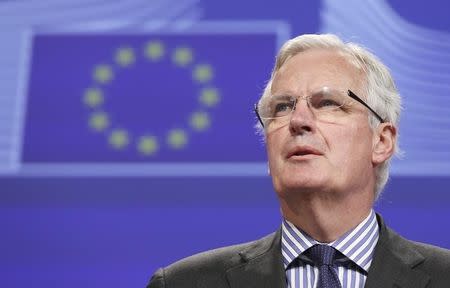EU's Barnier tells UK it has key role in markets union
By Huw Jones
LONDON (Reuters) - The European Union is not trying to weaken the City of London, which will be in pole position to shape a new EU capital markets union, the bloc's outgoing financial services chief said on Monday.
Michel Barnier steps down at the end of October after a frantic five-year stint during which more than 40 new financial laws were approved, some of which Britain is challenging in the EU's top court.
He told an audience in the City - London's financial district which accounts for 37 percent of the EU's wholesale financial market - that Brussels has "no interest in undermining the UK" or London's place as the bloc's top financial centre.
Instead it wants to further integrate the 28-country single market by creating a capital markets union to boost share listings and private investments and improve the effectiveness of non-bank financing for the economy.
"Given the UK's position as home to Europe's largest capital market, it is obvious that it should play a central position in this game," Barnier said. "This will be one very important project that my successor will want to drive forward."
Incoming European Commission President Jean-Claude Juncker has put the creation of a capital markets union at the core of his programme to revive the EU economy and chose a Briton, Jonathan Hill, to succeed Barnier.
Barnier, once dubbed in the British press as the most dangerous man in Europe because of his influence over the UK financial sector, sought to soothe concerns that a euro zone banking union would sideline Britain.
From November the European Central Bank will supervise top lenders in the single currency area but Barnier said safeguards have been introduced to stop non-euro zone states being outvoted on banking rules.
"But we need to be vigilant in keeping that delicate balance between the interests of countries both inside and outside of the euro area," Barnier said.
NEW RULES
Barnier said he could see a non-euro zone country joining the banking union to underpin the stability of its banks.
Former Bank of England Deputy Governor Rachel Lomax said there were no technical reasons stopping Britain joining the supervisory side of the banking union.
Echoing comments from Hill, Barnier said that setting the new rules to avoid a repeat of the 2007-09 financial crisis, which forced taxpayers to shore up banks, was only the first half of the game in Europe.
"Nobody should be spending millions on advisors' fees just to find loopholes so that 'business as usual' can continue," Barnier said. "Enforcing them is the vital second half ... There is no 'business as usual'. Enhanced supervision and regulation is the new normal."
Asked to comment on concerns over the impact of escalating U.S. fines on EU banks for misconduct, Barnier said the bloc needed a common voice to protect financial stability.
"I think that it will be useful and even necessary for the Europeans together to think about how to defend European financial stability against any kind of threats ... and to make sure that European rules are respected by everybody," he said.
"I think the capacity to react or to defend is not clear and strong enough today."
Britain goes to the polls next year with the Conservatives and upstart rival UKIP vying for the eurosceptic vote, promising either a pullout from the EU or a referendum on membership.
City of London Lord Mayor Fiona Woolf said EU membership is one of the "open secrets" of UK success and if it left it would still have to apply EU rules but without a seat at the table.
"Red tape must not be allowed to shackle business competitiveness. We need to allow the regulatory reforms to bed in and to assess their impact," Woolf told the event.
(The story corrects spelling of name to Woolf in last two paragraphs)
(Editing by Susan Thomas and David Holmes)




